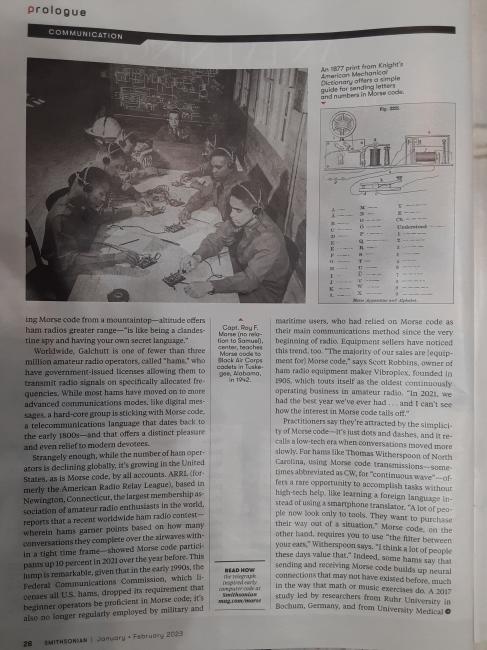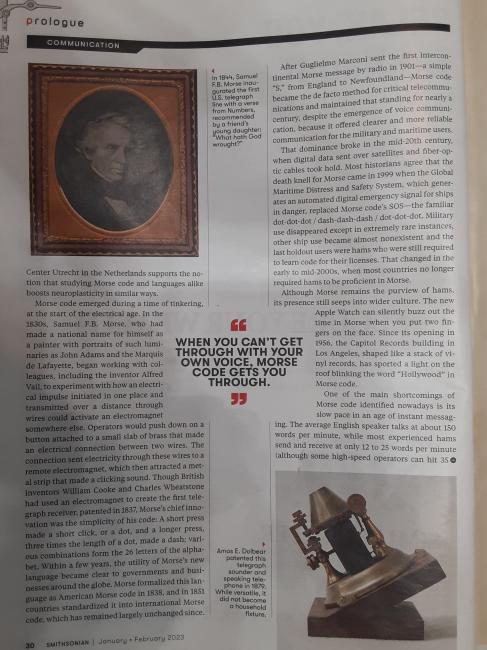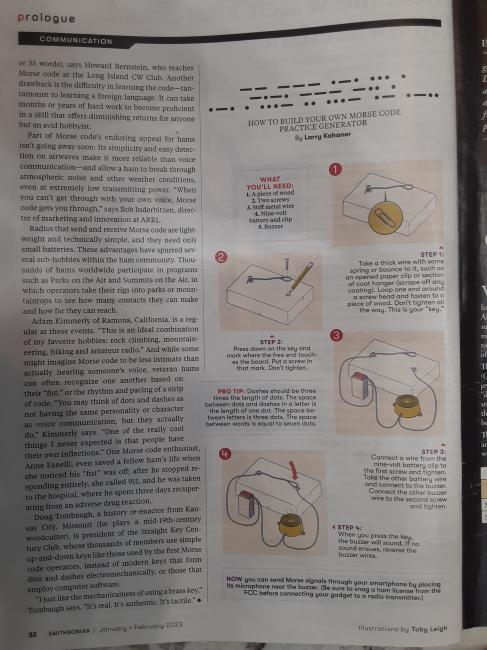News for week of 2023-01-09 (all current event convos go here)
Make a top-level comment for a new story/topic. Discussions about the topic should be in the replies to the top-level comment. That way things stay organized and every main comment as you scroll down is a different piece of news.
-
Comments (49)
-
Eric - January 9, 2023
Brazil: Bolsonaro supporters storm capitol based on his false claims of election fraud
-
Eric - January 9, 2023
How COVID infection became normalized despite the rising cost
“Presenting COVID infection as normal was achieved not by force, but by coercive persuasion.”
https://mobile.twitter.com/BlairWilliams26/status/1611845006020706304
-
underprepraccoon - January 9, 2023
US Farmers win right to repair John Deere equipment
https://www.bbc.com/news/business-64206913
-
Momof6 - January 9, 2023
Finally
-
-
pnwsarahContributor - January 10, 2023
-
Shaun - January 10, 2023
@pnwsarah,
How are you doing? Your house?
-
pnwsarahContributor - January 10, 2023
Hey, thanks for asking, Shaun. It appears that we live on an island of geologic and hydrologic calm in a saturated, crumbling county in a drenched, desperate state. Additionally, I just had a certified arborist tell me that all of my trees are safe and healthy, so I might even be sleeping in my bedroom tonight?!
-
M. E.Contributor - January 11, 2023
That is the best news I’ve heard all day! I’ve been wondering about you all week long. Glad to hear you (and the trees) are safe.
-
pnwsarahContributor - January 11, 2023
Aw, thanks, M.E.! I so appreciate your concern!
-
pnwsarahContributor - January 14, 2023
In Northern California, one coastal town hasn’t seen power for nearly a week [URL: https://www.nytimes.com/live/2023/01/10/us/california-storms-rain-weather/in-northern-california-one-coastal-town-hasnt-seen-power-for-nearly-a-week%5D
This is very near where I was living (alone, except for my new puppy) when I realized that I needed to start thinking seriously about disaster preparedness.
-
-
Gideon ParkerStaff - January 10, 2023
New app inspired by pets killed in Marshall Fire hopes to connect neighbors ahead of emergencies
https://www.cbsnews.com/colorado/news/new-app-pets-killed-marshall-fire-connect-neighbors-phar/
-
underprepraccoon - January 10, 2023
U.S. FDA says Evusheld may not protect against Omicron subvariant XBB.1.5
-
Eric - January 10, 2023
Unfortunately, none of the antibody products work on current COVID variants, which is a huge problem for immunocompromised people who were relying on them.
-
-
Eric - January 10, 2023
At least 17 dead in deadliest day of anti-government protests in Peru
-
Steve Martin - January 10, 2023
This just in….. an undeclared shipment radioactive stuff was just seized at Heathrow Airport by British Intelligence. It had been sent from Pakistan to Iranians based in Great Britain. Perhaps a dirty bomb in the making? Sensors at Heathrow alerted officials.
-
Carlotta SusannaStaff - January 10, 2023
@Steve Martin, could you give us the courtesy to link to your sources next time? Thanks.
-
Eric - January 11, 2023
Here’s an article that roughly matches what Steve is talking about. A small amount of natural uranium was mixed in with some scrap metal. Investigation is still in progress, but this doesn’t sound like something to worry about.
https://www.timesofisrael.com/british-police-probe-uranium-package-seized-at-heathrow-airport/amp/
-
-
Lindsey - January 11, 2023
This story was in the Smithsonian Magazine for the January/February 2023 issue. I thought the note on being able to get through with Morse code when you can’t get through with your voice was interesting. Plus the option to build a Morse code practice generator seems like it could be fun!
-
underprepraccoon - January 11, 2023
Oh a reminder to check any COVID rapid tests you have, I did it recently and it wasn’t terribly hard, just look up the company that made them and plug in the batch numbers.
Would recommend an extra fine point Sharpie for it.
“Some newly mailed Covid tests from the government expire imminently — even with extensions”
https://www.nbcnews.com/health/health-news/free-covid-tests-government-may-expire-soon-rcna65076
-
Shaun - January 12, 2023
This is a commentary on the unfolding ‘excess death’ problem health officials are dealing with now. Based on CDC numbers. I don’t think we will have a clear picture for a year or more. Basically, bad health and bad behavior trends accelerated during lock downs. These trends are accelerating. That makes sense, but I don’t see an obvious solution if we use lock downs in the next pandemic.
-
Eric - January 12, 2023
Being ready to lockdown for a few weeks is prepper 101 because it helps with such a wide variety of emergencies. Lockdown is the last resort for desperate situations. Mar 2020 clearly qualified.
So what were better, less expensive alternatives? Here are a bunch of options:
- Starting preparations in Jan 2020 instead of Mar 2020
- Public education about how it spreads and how to protect yourself
- Wearing N95s
- Developing tests faster and scaling up their availability
- Improving building ventilation and/or air cleaning to 6-12 ACH
- Ventilated cubicles for factory workers that must work close to each other
- Sick leave
- Contact tracing based on tests and/or symptoms and proactively isolating close contacts
- Adjusting work so that more of it can be done from home or private offices
- Moving recreational activities outside rather than in large buildings
-
Shaun - January 12, 2023
@Eric, yes, being ready for lock down is a readiness objective.
The thrust of the article was about non-COVID deaths due to excessive drinking during lock down, failure to go to the doctor for routine exams and dying of heart disease or cancers, diabetes or increased murders(?!), stopping ongoing medical treatments for fear of hospitals.
The older you were, the more likely you died of a known morbidity that was not treated. The younger, the more likely you died of accidents, alcoholism and violence.
From a readiness perspective, those of use with ongoing medical treatment regimens need to find a way to maintain those and/or increase our healthy activities. Those of us younger need to find a way to avoid increased consumption of alcohol, drugs and the circumstances where violence may occur.
It would be a valuable ‘after action’ to get together with our family and friends and discuss the lessons learned, what we would do differently, and how we would have helped our neighbors and extended family. Focusing on choices would help us avoid some of these ‘excess deaths’.
-
Eric - January 12, 2023
“failure to go to the doctor for routine exams and dying of heart disease or cancers, diabetes”
I think the article author may be misunderstanding the reason that heart attack and diabetes deaths increased while everyone was getting COVID. A person’s odds of a heart attack is twice as high for a year after getting COVID. A person’s odds of getting diabetes are about 50% higher for a year after getting COVID.
The issues you bring up are still worth considering. This article just isn’t a good source for learning about COVID or epidemiology.
-
Shaun - January 12, 2023
@Eric,
Do you have sources for those post-COVID morbidity statistics? I have never heard of that and am interested.
-
Carlotta SusannaStaff - January 12, 2023
@Shaun FWIW we’ve covered some of these statistics in past news roundups. As an example, in the Dec 06 roundup, I reported about “Covid is associated with a >60% increased risk of newly diagnosed diabetes.” (here’s the study cited).
I’ll see if I can find more.
-
Carlotta SusannaStaff - January 12, 2023
From the Nov 15 roundup: Dr. Eric Feigl-Ding posted a Twitter thread about how Covid reinfections increase risks of death and hospitalizations and cited a Reuters article (“Reinfected patients had a more than doubled risk of death and a more than tripled risk of hospitalization compared with those who were infected with COVID just once. They also had elevated risks for problems with lungs, heart, blood, kidneys, diabetes, mental health, bones and muscles, and neurological disorders, according to a report published in Nature Medicine.”)
From the Nov 18 roundup: (Small) increase in children’s epilepsy or seizures within 6 months of infection compared to flu (link to article).
From the Nov 08 roundup: Twitter thread about the dangers of infection & reinfection (notably about how Covid is a vascular disease, the effects on the brain, and the heart).
These are some of the most recent stuff I published in the roundups, but I’ve been taking a break from the news since stop writing the blog so I’m admittedly not up to date with everything.
-
Shaun - January 12, 2023
@Carlotta Susanna,
Thank you for your effort. I see what I will be reading this weekend.
-
Eric - January 12, 2023
“Do you have sources for those post-COVID morbidity statistics? I have never heard of that and am interested.”
I will find those and post them here.
Also relevant, here’s an article about 12-month mortality increases after COVID infection. It indicates that people under 65 hospitalized with COVID are 233% more likely to die over the next 12 months with non-COVID cause of death. It also says people hospitalized with COVID are 213% more likely to die of cardiovascular issues (this statement isn’t specific to under 65).
https://www.frontiersin.org/articles/10.3389/fmed.2021.778434/full
-
Eric - January 12, 2023
“Do you have sources for those post-COVID morbidity statistics?”
This is definitely not the same study I was thinking of, but close enough. It found 28% increased risk of developing diabetes within a few months of COVID infection, compared to a control group infected with some other respiratory virus.
-
Shaun - January 12, 2023
@Eric,
Thank you.
-
Eric - January 12, 2023
“Do you have sources for those post-COVID morbidity statistics?”
This article is about increased cardiovascular risk for a year after COVID infection. It found substantial increases in 20 types of cardiovascular disease, including 72% increased risk of heart failure and 52% increased risk of stroke.
-
Shaun - January 12, 2023
The paper they based their article on has many interesting points.
-
Amy S. - January 12, 2023
I read this piece and see a lot of assumptions and correlations with very little hard data. It raised more questions than answers. IMO, your last sentence that the “lock downs” caused the majority of excess deaths is not supported by the data here. The data does not show deaths spiked during “lock downs” (as compared to the entire covid era) or that excess deaths were higher in places with longer “lock downs”. There are many journal articles showing that excess deaths don’t have a clear cause. It is very complex. For example, excess deaths are higher in populations that participated in less “lock down” behavior. Reporting of the cause of death is not as accurate as this piece assumes in its premise. I don’t think CDC numbers will ever give us the answers.
-
Shaun - January 12, 2023
@Amy S,
“IMO, your last sentence that the “lock downs” caused the majority of excess deaths is not supported by the data here.”
That’s true – and I didn’t say that…it has to be investigated in the US and Europe.
Epidemiologists will have to do a lot of research to determine the cause(s) of excess deaths but it’s safe to say if you have diabetes and put on 40 lbs without any exercise, during lock down, your health will suffer and some will die. Fentanyl likely played a role. Missing your chemo appointments. Increased levels of alcoholism.
The medical community and government has to do a large study to figure this out.
There will be a long tail if all the missed appointments are shown to increase mortality.
-
Shaun - January 12, 2023
@Amy S.,
Excess deaths, for the sake of the original article, does NOT include deaths due to COVID. Those deaths are referred to as ‘COVID-related deaths’.
-
Amy S. - January 12, 2023
I apologize for misconstruing what you were concluding; I am really sorry I misunderstood your point.
I think some of my mistake might stem from the fact that you and I may have different ideas of what “lock down” pertains to. When you say: “it’s safe to say if you have diabetes and put on 40 lbs without any exercise, during lock down, your health will suffer and some will die” — I think I’m unclear what you mean by “lock down”.
Bottom line, we might have the same basic idea. I think reduced social connections has led to heartbreaking consequences for many people during the pandemic and the pandemic has had devastating repercussions in all sorts of ways. The misery, pain and the fatalities are beyond distressing. And sadly, they are not over.
But — still — I did not find the WSJ opinion piece or the underlying article provided me with any useful data regarding excess deaths.
-
Shaun - January 12, 2023
@Amy S.,
Thank you. I should have been more clear.
-
-
Amy S. - January 12, 2023
Chart with data on how the current rains in California compare to other heavy rain years:
-
Amy S. - January 12, 2023
And models predict another long week of wet patterns but then a sustained break in the rain for California.
-
-
AZ Desert Ranger - January 12, 2023
https://apnews.com/article/flight-delays-us-faa-updates-5805d15f520de8eadf52abb7b170487f
Same day that the Brit’s mail systems get hacked and the Canadian ATC NOTAM goes down. They say this was a ‘corrupt file’ issue, but it’s strangely coincidental with these other critical system failures. Even if this wasn’t the result of a hostile actor, how scary is it there there’s a single point of failure in the national ATC systems which can be instigated via a single file issue caused by one developer.
-
Eric - January 12, 2023
I am concerned about the possibility that this was a cyber attack, especially given the otherwise odd coincidence of all these systems going down on the same day.
I would not be nearly as concerned if it were just file corruption in the NOTAM system. The rest of our ATC system would work just fine without NOTAM. Planes were grounded out of an abundance of caution because it’s a bad sign when any part of the ATC system goes down.
-
-
underprepraccoon - January 12, 2023
“US Extends Covid Public-Health Emergency, Maintaining Access to Care”
They extended it to April
-
underprepraccoon - January 12, 2023
Possibly some good news finally
“Uganda on Wednesday declared the end of a nearly four-month Ebola outbreak that it briefly struggled to contain…”
https://www.reuters.com/world/africa/uganda-declares-end-ebola-outbreak-2023-01-11/
-
Eric - January 13, 2023
Comprehensive review of everything we know about long term effects of COVID, including odds of each condition, available treatments, and links to original sources.
https://www.nature.com/articles/s41579-022-00846-2
Key takeaways: Even with vaccination, each infection has 10% odds of long term symptoms. Those odds are 1-3x higher for unvaccinated people and 5-7 times higher for people who needed to be hospitalized. If you get COVID, take time to rest because that reduces the odds of some of these conditions.
-
Shaun - January 14, 2023
This is a very interesting article in the WSJ about the Harvard Study of Adult Development, that has been studying a group of people at Harvard and others in the Boston area for 85 years (!).
“In its 85 years and counting, the Harvard Study of Adult Development has found that personal connections are the most important factor in long-term health and happiness.”
In recent years, it has come to some very interesting conclusions about the best habits for a long, healthy and satisfying life. How to survive difficult times. And what may be the most accurate indicator of poor health and an early death.
Spoiler alert: it’s not 10,000 steps a day or eating vegan, it’s loneliness.
(you can read a few free articles on WSJ each month, otherwise it’s $1/week)
-
Shaun - January 14, 2023
If this is true, it will be very significant.
-
Eric - January 14, 2023
It’s a good thing to look into. Judging just by the WaPo article, it doesn’t sound very conclusive yet.
It’s very complicated to determine the primary cause of illness for an individual patient who has multiple simultaneous illnesses. It gets even more complicated when one illness can increase the odds of another illness, then disappear by the time the resulting death happens.
A more accurate count would look at the odds that a death was caused by COVID and give partial credit when COVID had a 70% or 20% chance of causing that death. That’s too hard on a case by case basis, which is why I tend to look at excess deaths, which have remained similarly high for three years in a row, to judge roughly how many people are dying due to COVID.
The article gives examples of someone with COVID and a heart attack. COVID often causes heart attacks. Did it cause this heart attack? Dr Wen thinks “no”. Neither of us actually knows.
The article gives an example of someone with COVID and pneumonia and a bacterial infection. COVID can cause pneumonia and can weaken the body to make a bacterial infection more likely. Dr Wen thinks it started with a bacterial infection that can also cause pneumonia and the COVID wasn’t relevant. The COVID infection is currently less severe than the bacterial infection, so she’s probably right, but still can’t be certain.
Dr Len is probably right that COVID hospitalizations are overcounted. Her proposed approach seems to undercount the same. And both approaches miss the problems caused later by apparently mild initial infections.
-
Eric - January 16, 2023
This article by Jeremy Faust, MD, is specifically a fact check on Dr Wen’s article. It explains how we know that the recent COVID death toll is higher than the official count, not lower as Dr Wen claimed. Dr Faust made no claim either way on the accuracy of COVID hospitalization counts, saying he didn’t know on that point.
https://insidemedicine.substack.com/p/data-snapshot-are-we-overcounting
-
-
Eric - January 14, 2023
For anyone trying to convince company management to improve COVID safety in the workplace, this report may be helpful. It talks about the problems COVID causes from a management perspective, in terms of lost productivity.
Combine that with COVID safety measures that aren’t very expensive compared with solving this problem.
The best option, if your type of work allows it, is working from home. This is great for employees, saves office space costs for the company, and almost fully solves the issue of sick employees.
Another good option is filling the workplace with air filters, such as corsi rosenthal boxes, and aiming for 12 ACH. You can buy a strong and quiet air filter from CleanAirKits for $200 each, place a bunch of them around the work area, and spend almost nothing on electricity to keep them running.
-
- News for the Week 2025-11-10 - 5 days ago
- News for the week of 2025-11-03 - 2 weeks ago
- News for the week of 2025-10-27 - 3 weeks ago
- News for the week of 2025-10-20 - 4 weeks ago
- News for the week of 2025-10-13 - 1 month ago
This forum is heavily moderated to keep things valuable to as many people as possible. Full community policies are here. The basics:
- 1. Be nice to each other.
- 2. Stay focused on prepping.
- 3. Avoid politics, religion, and other arguments.
- 4. No unfounded conspiracies, fake news, etc.
- 5. Debate ideas, not people.



